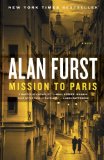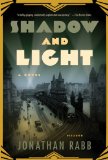Summary | Excerpt | Reviews | Beyond the book | Read-Alikes | Genres & Themes | Author Bio

Anyone who's read the movie listings during the last few months knows that
World War II and the Holocaust have recently been popular subjects for serious
films. Obviously, many of us are still struggling to make sense of what happened
and trying to make certain that these events don't fade into the past where they
become merely a part of history, among so many other half-forgotten horrors.
Philip Kerr's Bernie Gunther series, which began in the summer of 1936 with
March Violets and now continues with its fifth entry, A Quiet Flame,
takes us to the Buenos Aires of 1950 and, in the novelistic version of
flashbacks, Germany in 1932, bringing us the perspective of a German
policeman turned private detective, a man who is still working to understand
what happened to his country, his friends and colleagues, and himself.
When we left him, in 2006's
The One From the Other, Bernie was on the
verge of fleeing 1949 Germany - the reasons are best left unstated (not to ruin
the book from those who have it to look forward to) - for Argentina. Among his
traveling companions is Adolf Eichmann, a man Bernie has previously noted looks
very Jewish. Bernie himself is feeling old and, by the time he arrives in Buenos
Aires, is having worrisome physical symptoms.
But Germans given sanctuary in Argentina are expected to earn their keep, and
there's a job for him with the police once Bernie comes clean and admits who he
really is. He's asked to investigate the mutilation-murder of one young girl and
the disappearance of another. The murder has such disturbing similarities to two
that occurred in Germany, which Bernie investigated, in 1932, that the Buenos
Aires police fear that one of the Germans they gave shelter to after World War
II may have brought his murderous ways with him. If Bernie agrees, he'll be
treated by Eva Peron's own American doctor.
The plot allows Kerr to explore both Germany on the brink of Nazi rule and
Argentina, a "very Catholic country" where "it is better to know everything than
to know too much," as it works out its own identity under the rule of the Perons
(who make appearances as characters). And when Bernie agrees to look into the
disappearance of the aunt and uncle of a beautiful Jewish lawyer, the
similarities between 1932 Germany and Argentina in 1950 become depressingly
clear.
Kerr's first three Bernie Gunther novels (March
Violets,
The Pale Criminal and
A German Requiem) have been collected under the title Berlin Noir
(although the third one takes place mostly in Vienna) and noir is certainly the
key word. Bernie has a distinctive voice and the ability to distance
himself, if only a bit, from his world through his smart aleck reactions and
language:
"I'd heard a lot about Proust. One day I was going to have to find an excuse
not to read him."
"[W]hereas Berlin had flaunted its vice and corruption, Buenos Aires hid its
appetite for depravity like an old priest sipping from a brandy bottle concealed in the pocket of a cassock."
"I ordered a bottle of red wine, the kind I knew Anna liked, made of grapes
and alcohol."
"'There are no murderers,'" I said. "There are just plumbers and shopkeepers
and lawyers who kill people. Everyone's quite normal until they pull the
trigger. That's all you need to fight a war. Lots of ordinary people to kill lots of other ordinary people. Couldn't be easier.'"
"I was keen to be someone who looked good in her eyes—not least because every
time I saw myself in a mirror, my own eyes were telling me something different.
And I'm not just talking about my appearance. I still had all my hair. There was
even quite a bit of color left in it. But my face was hardly what it used to be,
while my stomach was more than it had ever been. I was stiff when I awoke in the
morning, in all the wrong places and for all the wrong reasons. And I had
thyroid cancer. Apart from all that, I was just fine and dandy."
And, since this is noir fiction, Bernie gets to let loose on the subject of women quite frequently:
"I watched her go. I was glad to see the back of her. More important, I was
glad to see her behind... In a different room and wearing a clean shirt, I
might have tried slapping it. Some men liked slapping a guitar or a set of
dominoes. With me it was a woman's ass. It wasn't exactly a hobby. But I was
good at it. A man ought to be good at something." (The woman in question is Eva
Peron.)
"She looked flushed and very grateful, which is the way I like my women."
"She wore... a matching long pencil skirt that made me wish I had a couple
of sheets of paper."
"I... let the smoke curl into my eyes. I wanted to punish them for looking
into her cleavage when what I needed most was for them to do their job and keep
looking her in the eye so that I might get a better fix on whether she was
telling the truth. But I guess that's how things like cleavages evolved in the
first place."
Nazi Germany and Argentina under the Perons are places perhaps best visited
from the safety of an armchair, but Kerr never stints on atmosphere and his
books are a kind of immersion into place and time that can be hard to shake off.
He's both an excellent novelist and gifted architect of mysteries and his
dialogue is first-rate. As Colonel Montalban, Bernie's police boss says, "'To be a great detective one must also be a protagonist. A
dynamic sort of character who makes things happen just by being himself. I think
you are this kind of person, Gunther.'"
Montalban's right and readers are all the richer for it.
If the Dead Rise Not, the next in the Bernie Gunther series, publishes in the US on March 18, 2010.
![]() This review was originally published in The BookBrowse Review in April 2009, and has been updated for the
March 2010 edition.
Click here to go to this issue.
This review was originally published in The BookBrowse Review in April 2009, and has been updated for the
March 2010 edition.
Click here to go to this issue.

If you liked A Quiet Flame, try these:

by Alan Furst
Published 2013
From Alan Furst, the bestselling author, often praised as the best spy novelist ever, comes a novel that's truly hard to put down. Mission to Paris includes beautifully drawn scenes of romance and intimacy, and the novel is alive with extraordinary characters.

by Jonathan Rabb
Published 2010
Berlin, between the two world wars. When an executive at the renowned Ufa film studios is found dead floating in his office bathtub, it falls to Nikolai Hoffner, a chief inspector in the Kriminalpolizei, to investigate.
Your guide toexceptional books
BookBrowse seeks out and recommends the best in contemporary fiction and nonfiction—books that not only engage and entertain but also deepen our understanding of ourselves and the world around us.